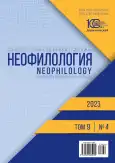Plot transformation of “Mozart and Salieri” tragedy by A.S. Pushkin in the story “Pi Day” by N. Dashevskaya
- Authors: Zhutova S.Y.1, Sorokina N.V.1
-
Affiliations:
- Derzhavin Tambov State University
- Issue: Vol 9, No 4 (2023)
- Pages: 845-854
- Section: RUSSIAN LITERATURE AND LITERATURE OF PEOPLES OF RUSSIAN FEDERATION
- URL: https://journal-vniispk.ru/2587-6953/article/view/295782
- DOI: https://doi.org/10.20310/2587-6953-2023-9-4-845-854
- ID: 295782
Cite item
Full Text
Abstract
The ways of reflecting classical texts in modern literature on the example of the story “Pi Day” by N. Dashevskaya addressed for teenage readers are considered. It is shown how the creation is formed on the allusion to the tragedy “Mozart and Salieri” by A.S. Pushkin. The specificity of a new type of hero, developed in the context of traditions, taking into account the ideas about modern teenager personality is revealed. The correlation of the plot about Mozart and Salieri with the literary hero of the new time is described. In the main antagonists’ images of N. Dashevskaya’s story – Lev Inozemtsev and Kirill Komlev – the positive and negative features combination is emphasized. The methods of gifted teenager image formation in the creation are characterized, the artistic embodiment specificity of his socialization, adaptation way in the school community is determined. Differences number of the modern author’s book from the classical creation are highlighted, the writer’s desire to form in young readers the need to have a look at the source material is emphasized. The compositional features of the story “Pi Day” are defined: division into two equal parts, narration on behalf of different characters, fragmentary day-night narration. The practical significance of the research, the results using possibility in literature school teaching as a way of increasing the high school students reading interest to the classic Russian literature is outlined.
About the authors
S. Y. Zhutova
Derzhavin Tambov State University
Author for correspondence.
Email: zhutovasu@mail.ru
ORCID iD: 0009-0009-2728-0659
Post-Graduate Student
33 Internatsionalnaya St., Tambov 392000, Russian FederationN. V. Sorokina
Derzhavin Tambov State University
Email: sorok_tam@rambler.ru
ORCID iD: 0000-0002-4449-938X
Dr. habil. (Philology), Professor, Professor of Russian and Foreign Literature Department
33 Internatsionalnaya St., Tambov 392000, Russian FederationReferences
- Borzilo O.S. Game with classics in postmodern culture. Vestnik Omskogo gosudarstvennogo pedagogicheskogo universiteta. Gumanitarnye issledovaniya = Review of Omsk State Pedagogical University. Humanitarian Re-search, 2017, no. 3 (16), pp. 10-12. (In Russ.) https://elibrary.ru/zxnvhp
- Amineva E.S. Theoretical aspects of the interpretation problem of the classical tradition in the post-modern text (case of J. Fowles). Vestnik Priamurskogo gosudarstvennogo universiteta im. Sholom-Aleikhema = Bulletin of Sholom Aleichem Priamur State University, 2021, no. 2 (43), pp. 9-24. (In Russ.) https://doi.org/10.24412/2227-1384-2021-243-9-24, https://elibrary.ru/jpqczz
- Markina E.E., Kostina M.V. The phenomenon of postmodernism in the latest scientific research. Sovremennye problemy nauki i obrazovaniya = Modern Problems of Science and Education. Surgery, 2015, no. 2-2. (In Russ.) https://elibrary.ru/uzjbef
- Nepomnyashchii V.S. (ed.-compiler). «Motsart i Sal’eri», tragediya Pushkina. Dvizhenie vo vremeni. 1840-e – 1990-e gg.: v 8 t. [“Mozart and Salieri”, Pushkin’s Tragedy. Movement in Time. 1840s – 1990s: in 8 vols.]. Moscow, 1997, vol. 3, 944 p. (In Russ.) https://elibrary.ru/wbhgjt
- Kuzicheva M. Pushkin i Motsart: k voprosu o rodstve poetik [Pushkin and Mozart: to the question of kinship of poetics]. Voprosy literatury [Questions of Literature], 2014, no. 2, pp. 272-309. (In Russ.) https://elibrary.ru/txtcpv
- Tolstoguzov P.N. Tragedy “Mozart and Salieri’: conflict phenomenology and culturology. Nauchnyi dialog = Nauchnyi Dialog, 2018, no. 9, pp. 192-202. (In Russ.) https://doi.org/10.24224/2227-1295-2018-9-192-202, https://elibrary.ru/gnxjgz
- Belza I.F. Motsart i Sal’eri: (Ob istoricheskoi dostovernosti tragedii Pushkina) [Mozart and Salieri: (On the His-torical Reliability of Pushkin’s Tragedy)]. Pushkin: Issledovaniya i materialy: v 15 t. [Pushkin: Research and Materials: in 15 vols.]. Moscow, Leningrad, USSR Academy of Sciences Publ., 1962, vol. 4, pp. 237-266. (In Russ.)
- Nepomnyashchii V.S. Sobranie trudov: v 5 t. [Collected Works: in 5 vols.]. Moscow, Publishing Center Moscow State Institute of Culture, 2019, vol. 5, 592 p. (In Russ.)
- Lanin B.A. Sovremennaya literatura v shkole XXI veka [Modern literature in the school of the 21st century]. Problemy sovremennogo obrazovaniya = Problems of Modern Education, 2010, no. 5, pp. 55-60. (In Russ.) https://elibrary.ru/ntlzzl
- Kuteinikova N.E. Gifted children in the realities of life and in fiction of the 21st century: Nina Dashevskaya “Pi Day”. 7–9 grades. Literatura v shkole = Literature at School, 2019, no. 2, pp. 37-40. (In Russ.) https://elibrary.ru/cxhufx
- Zhutova S.Yu., Sorokina N.V. “Teenager Ashim” by E. Basova: a schooler and a teacher in the modern digital world. Literatura v shkole = Literature at School, 2023, no. 2, pp. 118-128. (In Russ.) https://doi.org/10.31862/0130-3414-2023-2-118-128, https://elibrary.ru/gbidrp
Supplementary files









